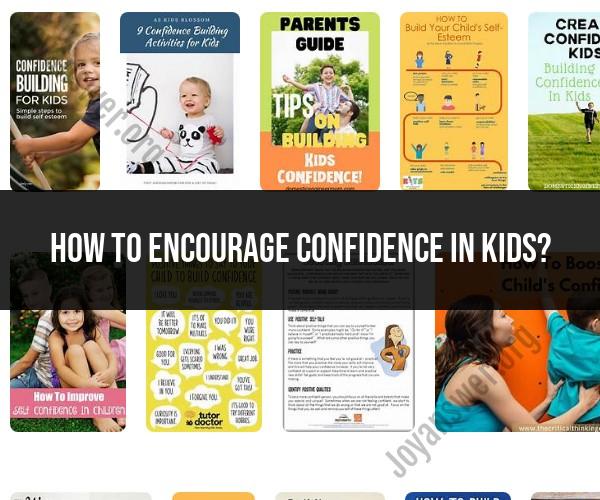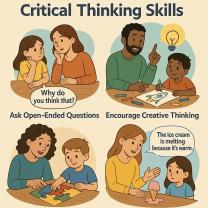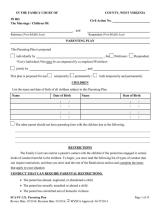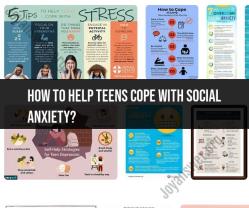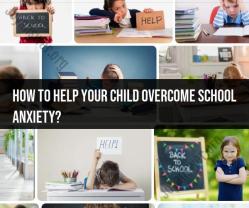How to encourage confidence in kids?
Building confidence in children is an essential aspect of parenting that can have a lasting impact on their self-esteem and overall development. Here are some parenting approaches to encourage confidence in kids:
Provide Unconditional Love and Support:
- Make sure your children know that you love and support them unconditionally, regardless of their successes or failures. This creates a secure emotional foundation for them.
Offer Positive Reinforcement:
- Praise and acknowledge your child's efforts and achievements, no matter how small. Be specific in your praise to help them understand what they did well.
Set Realistic Expectations:
- Encourage your child to set achievable goals and celebrate their accomplishments. Avoid setting impossibly high expectations that can lead to frustration.
Foster Independence:
- Allow your children to take on age-appropriate responsibilities and make decisions. This helps them develop a sense of competence and self-reliance.
Teach Problem-Solving Skills:
- Help your children develop problem-solving skills by allowing them to work through challenges on their own. Guide them with questions and suggestions rather than solving problems for them.
Promote a Growth Mindset:
- Encourage a growth mindset by emphasizing the importance of effort, learning from mistakes, and resilience. Teach them that abilities can be developed over time.
Model Confidence:
- Children often learn by example. Demonstrate self-confidence in your own actions and decisions, and show them that it's okay to make mistakes.
Provide Opportunities for Exploration:
- Encourage your children to explore different interests and activities. Exposure to a variety of experiences can help them discover their strengths and passions.
Offer Constructive Feedback:
- When offering feedback or criticism, do so in a constructive and encouraging way. Focus on how they can improve rather than criticizing their abilities.
Listen Actively:
- Take the time to listen to your child's thoughts, feelings, and concerns. Show empathy and validate their emotions, which can boost their self-esteem.
Avoid Comparisons:
- Avoid comparing your child to others, as this can lead to feelings of inadequacy. Emphasize that each person is unique and has their own strengths.
Encourage Extracurricular Activities:
- Enroll your child in activities or hobbies they enjoy and are passionate about. Participation in sports, arts, or other pursuits can boost self-confidence.
Celebrate Effort, Not Just Outcomes:
- Emphasize the value of hard work and determination, regardless of the outcome. Teach them that trying their best is an achievement in itself.
Create a Positive Home Environment:
- Foster a home environment where your child feels safe expressing themselves and taking risks without fear of harsh judgment.
Seek Professional Help When Needed:
- If your child struggles with severe self-esteem or confidence issues, consider seeking guidance from a child psychologist or counselor who specializes in children's mental health.
Remember that building confidence is an ongoing process, and it's important to be patient and supportive as your child develops a healthy sense of self-assurance.
Fostering Confidence in Children: Tips for Parents and Caregivers
Here are some tips for parents and caregivers on how to foster confidence in children:
- Be a positive role model. Children learn by watching the adults in their lives. Show your children that you believe in yourself and your abilities by taking on challenges, trying new things, and facing setbacks with a positive attitude.
- Provide unconditional love and support. Let your children know that you love them no matter what. This will give them a strong foundation of self-worth and help them to feel confident in their abilities.
- Set realistic expectations. When you set expectations for your children, make sure that they are realistic and achievable. This will help them to feel successful and boost their confidence.
- Celebrate their accomplishments. It is important to celebrate your children's accomplishments, both big and small. This will help them to recognize their strengths and build confidence in their abilities.
- Encourage them to try new things. Don't be afraid to let your children try new things, even if they are afraid or unsure of themselves. This will help them to learn new skills, develop their interests, and build confidence in their abilities.
- Teach them how to cope with failure. Everyone makes mistakes. It is important to teach your children how to cope with failure in a healthy way. Help them to learn from their mistakes and to keep trying.
Empowering Kids to Believe in Themselves: Confidence-Building Strategies
Here are some confidence-building strategies that parents and caregivers can use to empower kids to believe in themselves:
- Help them to identify their strengths and talents. Everyone has strengths and talents. It is important to help your children to identify their strengths and talents so that they can develop them and feel proud of themselves.
- Give them opportunities to succeed. Provide your children with opportunities to succeed at things that they are interested in. This will help them to build confidence in their abilities.
- Encourage them to take risks. It is important to encourage your children to take risks and try new things. This will help them to learn and grow, and it will also help them to build confidence in their abilities.
- Help them to develop positive self-talk. Positive self-talk is the practice of talking to yourself in a positive and supportive way. Help your children to develop positive self-talk by teaching them to identify and challenge negative thoughts.
- Connect them with positive role models. Positive role models can show your children what is possible and can inspire them to believe in themselves. Help your children to connect with positive role models who can support them and encourage them to reach their full potential.
Boosting Self-Confidence in Kids: Practical Steps for Success
Here are some practical steps that parents and caregivers can take to boost self-confidence in kids:
- Spend quality time with them. One of the best ways to boost a child's self-confidence is to spend quality time with them. This shows them that you love and care about them, and it gives you an opportunity to get to know them and their interests.
- Listen to them. When your children talk to you, listen to them attentively. Show them that you are interested in what they have to say, and ask them follow-up questions. This will help them to feel valued and respected.
- Provide positive feedback. Focus on your children's positive qualities and accomplishments. Give them specific and sincere praise when they do well. This will help them to feel good about themselves and their abilities.
- Avoid negative comparisons. It is important to avoid comparing your children to others. This can make them feel inadequate and damage their self-confidence.
- Help them to develop a growth mindset. A growth mindset is the belief that intelligence and abilities can be developed through hard work and dedication. Help your children to develop a growth mindset by teaching them that mistakes are opportunities to learn and grow.
By following these tips and strategies, parents and caregivers can help children to develop strong self-confidence. Self-confidence is an important quality that can help children to succeed in all areas of their lives.
